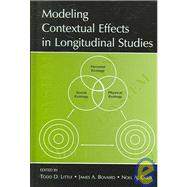
Note: Supplemental materials are not guaranteed with Rental or Used book purchases.
Purchase Benefits
What is included with this book?
| Preface | p. vii |
| Modeling Ecological and Contextual Effects in Longitudinal Studies of Human Development | p. 1 |
| Statistical Analysis With Incomplete Data: A Developmental Perspective | p. 13 |
| Alternatives to Traditional Model Comparison Strategies for Covariance Structure Models | p. 33 |
| Impact of Measurement Scale in Modeling Developmental Processes and Ecological Factors | p. 63 |
| The Incorporation of Categorical Measurement Models in the Analysis of Individual Growth | p. 89 |
| Representing Contextual Effects in Multiple-Group MACS Models | p. 121 |
| Multilevel Structural Equation Models for Contextual Factors | p. 149 |
| Mixed-Effects Regression Models With Heterogeneous Variance: Analyzing Ecological Momentary Assessment (EMA) Data | p. 183 |
| Structural Equation Modeling of Mediation and Moderation With Contextual Factors | p. 207 |
| Moderating Effects of a Risk Factor: Modeling Longitudinal Moderated Mediation in the Development of Adolescent Heavy Drinking | p. 231 |
| Modeling Complex Interactions: Person-Centered and Variable-Centered Approaches | p. 255 |
| Accounting for Statistical Dependency in Longitudinal Data on Dyads | p. 285 |
| Coupled Dynamics and Mutually Adaptive Context | p. 299 |
| Modeling Intraindividual and Intracontextual Change: Rendering Developmental Contextualism Operational | p. 325 |
| The Shape of Things to Come: Diagnosing Social Contagion From Adolescent Smoking and Drinking Curves | p. 343 |
| A Dynamic Structural Analysis of the Impacts of Context on Shifts in Lifespan Cognitive Development | p. 363 |
| Intrauterine Environment Affects Infant and Child Outcomes: Environment as Direct Effect | p. 387 |
| Conceptualizing and Measuring the Context Within Person [Left Arrow][Right Arrow] Context Models of Human Development: Implications for Theory, Research and Application | p. 437 |
| Author Index | p. 457 |
| Subject Index | p. 469 |
| Table of Contents provided by Ingram. All Rights Reserved. |
The New copy of this book will include any supplemental materials advertised. Please check the title of the book to determine if it should include any access cards, study guides, lab manuals, CDs, etc.
The Used, Rental and eBook copies of this book are not guaranteed to include any supplemental materials. Typically, only the book itself is included. This is true even if the title states it includes any access cards, study guides, lab manuals, CDs, etc.